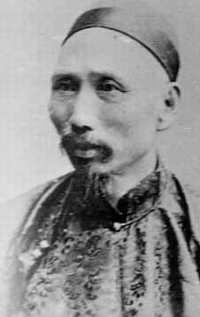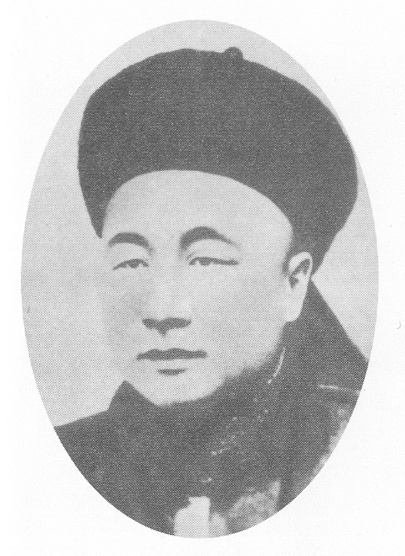<Back to Index>
- Admiral of the Beiyang Fleet Ding Ruchang, 1836
- Captain of the Beiyang Fleet Deng Shichang, 1849
PAGE SPONSOR

Ding Ruchang (Chinese: 丁汝昌) (18 November 1836 - 12 February 1895) was a career military officer in the late Qing dynasty military of China.
Ding was a native of what is now part of Chaohu City in Anhui Province, China. He joined the Taiping Rebellion in 1854, but he later surrendered with Cheng Xuechi in the Battle of Anqing in 1861, and defected to the imperial cause. He joined Li Hongzhang’s Huai Army as a cavalryman to help suppress the Taiping Rebellion, serving with Liu Mingchuan. Afterwards, he was active in helping suppress the Nien Rebellion, and was awarded with the equivalent in rank to colonel. In 1874, he protested against the Qing Dynasty government's decision about reduction of the army size. He went back to his hometown to avoid being killed.
In 1875, Li Hongzhang recruited Ding to be a commander of the Beiyang Fleet, the most modern of China’s regional navies. In 1880, he traveled to Great Britain to accept delivery of the cruiser Chaoyun, and to familiarize himself with European shipbuilding techniques at shipyards in Germany and France. Ding was a supporter of the Self - Strengthening Movement in China, and urged Li Hongzhang to create shipyards in China able to build modern armored cruisers, rather than relying on foreign imports. Ting took an active role in the creation of the naval bases at Weihaiwei and Lushunkou.
In 1882, Ding was an observer during the negotiations resulting in the normalization of trade between Korea and the United States. He later helped suppress the Imo rebellion, with his marines arresting Heungseon Daewongun of the father of King Gojong, after arriving at Incheon with a fleet of seven ships.
During the Franco - Chinese War of 1884, Ding was awarded the Yellow Riding Jacket by the Qing Emperor, traditionally the highest military awards in the Qing Empire.
In 1886, Ding participated in a show of force, with the Beiyang Fleet touring Hong Kong, the Japanese port of Nagasaki, Korean ports of Busan and Wonsan, and the Russian naval base of Vladivostok. While in Nagasaki on 13 August 1886, a number of drunken sailors from Zhenyuan became involved in a brawl in a local brothel, during which a Japanese police officer was fatally stabbed. In what came to be called the Nagasaki Incident two days later in a riot between local police and Ding’s sailors six sailors were killed and 45 wounded, along with five Japanese policemen killed and 16 wounded. The riot resulted in a diplomatic incident, but Ding was able to make a second trip to Japan with the Beiyang Fleet in 1891. Ding was promoted to admiral and commander of the Beiyang Fleet from 1888 - 1894, and was promoted to the position of vice naval minister in 1894.
During the First Sino - Japanese War of 1894 - 1895, Ding pushed for a direct confrontation with the Imperial Japanese Navy, but was ordered by Beijing not to operate east of the mouth of the Yalu River, for fear that China’s prized modern warships would be damaged or destroyed. However, this is what happened at the Battle of the Yalu River on 17 September 1894, during which Ding lost five of the ten ships in his fleet. He also became a casualty of the battle from the opening shot of his own vessel, the Dingyuan, which had a construction defect, along with a number of officers also present on the bridge.
During the Battle of Lushunkou, Ding was ordered to withdraw his ships to the safety of Weihaiwai without giving battle to the Japan. During the subsequent Battle of Weihaiwei, his ships were kept within the protective confines of the harbor, but the situation proved hopeless once the Imperial Japanese Army had seized the shore fortifications and lowered the boom enclosing the harbor to permit attacks by Japanese torpedo boats. Ding refused offers of political asylum by Japanese admiral Itoh Sukeyuki and committed suicide by overdose of opium in his office at his Liugong Island headquarters. His deputy, Admiral Liu, after ordering that his warship be scuttled by explosives, also committed suicide. The remnants of the Beiyang Fleet surrendered to the Japanese.
After his death, Ding was blamed by the Qing government for the defeat, and posthumously stripped of all ranks and positions. However, the manner of his death earned him the respect of the Japanese as well as many members the Chinese military. At the request of surviving generals in 1911, he was restored to all of his ranks, and his family was able to give him a proper burial in 1912 after the Xinhai Revolution overthrew the Qing dynasty.

Deng Shichang (simplified Chinese: 邓世昌; traditional Chinese: 鄧世昌; courtesy name Zhengqing (正卿).) (1849 - 17 September 1894) was a career military officer in the late Qing dynasty military of China.
Deng was a native of what is now part of Panyu District in Guangdong Province, China. He was one of the first generation of modern naval officers trained in China, having entered the Fujian Naval Academy (船政學堂) in Mawei, Fujian in 1867 where the French military advisor Prosper Giquel had constructed the Foochow Arsenal and where he caught the attention, by graduating with honors, of Shen Baozhen in 1874. Deng was sent to the Pescadores and to Keelung in Taiwan on graduation, to reinforce the defenses of those areas after the Taiwan Expedition of 1874 by Japan.
He gradually rose through the ranks, transferred to the Beiyang Fleet in 1880 and was assigned command of the cruiser Zhiyuen in 1887.
During the First Sino - Japanese War, he fought in the Battle of the Yalu River on 17 September 1894. Early in the battle, he moved aggressively against the Japanese command vessel Saikyō Maru, inflicting considerable damage on it, and coming under counterattack by the Japanese flying squadron led by Admiral Tsuboi Kōzō (Yoshino, Takachiho, Akitsushima and Naniwa). The Japanese cruisers circled Zhiyuan, firing at a more rapid pace and scoring more hits than the poorly trained Chinese gunners with their obsolete cannons. Deng Shichang ordered Zhiyuan to close on Naniwa to ram, but was hit in the bow by a shell fired from either Naniwa or Takachiho at 1550 hours on 17 September 1894, which caused a massive explosion, after which Zhiyuan rapidly sank. Some 245 officers and crewmen went down with the ship, including Deng, who according to Chinese accounts, refused rescue.
The Qing government eulogized Deng after the battle, granting him a posthumous peerage title, and giving large grants of gold and silver to his mother and widow.
In 1996, the People's Liberation Army Navy named a naval training ship as Shichang in remembrance of him. His birthplace has also been preserved as a memorial museum.